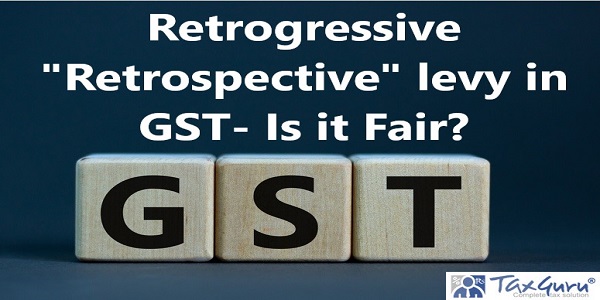Think of a situation where you walk in a park regularly and one fine day the authorities issue a retrospective order ill-legalizing this act and imposing fine on this act. How can this act be justifiable?
Are we supposed to have such superpowers or sixth sense where we are able to guess which activity earlier legal or not taxable was supposed to be illegal/exempt with retrospective effect? As the title of the article suggests , its high time government realized that this step is highly retrogressive in nature.
On 5th August 2021 Finance Minister Nirmala Sitharaman introduced The Taxation Laws (Amendment) Bill, 2021 in the Lok Sabha and finally moved to bury the ghost of this retrospective tax and the reasoning given for it was to help in promoting faster economic growth and employment.

This move had come in the wake of big companies like Vodafone Group and Cairn Energy Plc winning international arbitrations against the levy of retrospective taxes.
However this move has left some legit questions lingering in the heads of people subjected to retrospective taxation in GST. How would retrospective taxation in indirect taxes help boost economic growth? Or is it not unjust to tax retrospectively?
If you are wondering what is this issue all about, then let us understand the retrospective tax we are referring to here:
Before the retrospective levy:
Section 7(2) of the CGST Act,2017 contains Schedule III which includes activities which shall neither be treated as supply of goods nor services also termed as Negative List in GST these are:
1. Services by an employee to the employer in the course of or in relation to his employment;
2. Services by any court (District Court, High Court and Supreme Court) or Tribunal established under any law for the time being in force;
3. (a) the functions performed by the Members of Parliament, Member of State Legislatures, members of Panchayats, Members of Municipalities and Members of other local authorities;
(b) the duties performed by any person who holds any post in pursuance of the provisions of the Constitution in that capacity; or
(c) the duties performed by any person as a Chairperson or a Member or a Director in a body established by the Central Government or a State Government or local authority and who is not deemed as an employee before the commencement of this clause.
4. Services of funeral, burial, crematorium or mortuary including transportation of the deceased.
5. Sale of land and sale of building where the entire consideration has been received after completion certificate is issued or after its first occupation.
6. Actionable claims, other than lottery, betting and gambling. (Actionable claims are included in the definition of goods, However, schedule III provides that actionable claims other than lottery, betting and gambling shall be neither goods nor services.)
7. Supply of goods from a place in the non-taxable territory to another place in the non-taxable territory without such goods entering into India.
(a) Supply of warehoused goods (warehoused goods as defined in the Customs Act) to any person before clearance for home consumption;
(b) Supply of goods by the consignee to any other person, by endorsement of documents of title to the goods, after the goods have been dispatched from the port of original located outside India but before clearance for home consumption.
It needs to be noted here that the above highlighted entry has been amended retrospectively from 1st July 2017 and is made leviable to tax.
After the retrospective levy:
“Clause 99 of the Bill seeks to amend section 7 of the Central Goods and Services Tax Act, 2017, with retrospective effect from the 1st July, 2017, by inserting a new clause (aa) in sub-section (1) thereof, so as to ensure levy of tax on activities or transactions involving supply of goods or services by any person, other than an individual, to its members or constituents or vice-versa, for cash, deferred payment or other valuable consideration. It is also proposed to insert an Explanation therein, to clarify that the person or its members or constituents shall be deemed to be two separate persons and the supply of activities or transactions inter se shall be deemed to take place from one person to another.”
This levy however is subject to Exemption under Notification No. 12/2017 – CT (Rate) which states that
Services by an unincorporated body entity or a non-profit entity registered under any law for the time being in force, to its own members by way of reimbursement of charges or share of contribution –
1. As a trade union
2. For the provision of carrying out any activity which is exempt from the levy of GST; or
3. Upto an amount of Rs.7500 per month per member for sourcing of goods or services from a third person for the common use of its members in a housing society or a residential complex is EXEMPT.
Also CBIC Press Release No. 135 dated 22-01-2018 exempts RWA (Resident welfare association) if monthly subscription does not exceed Rs.7500 per member.
Affect of this retrospective levy with example:
| RWA | Monthly subscription per member | Before retrospective levy | After retrospective levy |
| A(Registered Person) | 8500 | GST exempt as per Point 3 of Schedule III | Yes GST leviable retrospectively from 1.07.2017 after insertion of clause(aa) in Schedule III |
| B(Registered Person) | 6000 | No as per exemption under CBIC Press Release No. 135 dated 22-01-2018 | No as per exemption under CBIC Press Release No. 135 dated 22-01-2018 |
Author’s Comments:
This retrospective levy means that an RWA will have to charge GST retrospectively from 1.7.2017(provided the membership fee is more than Rs. 7500 per member as per CBIC Press Release No. 135 dated 22-01-2018).
The purpose here is to disseminate knowledge and also point out the shortcomings of the government in this regard that any retrospective levy is retrogressive and hence should not be levied.
*****
The author can be reached at jainrashi2008@gmail.com.
DISCLAIMER: The views expressed are strictly of the author. The contents of this article are solely for informational purpose. It does not constitute professional advice or recommendation of firm. Neither the author nor firm and its affiliates accepts any liabilities for any loss or damage of any kind arising out of any information in this article nor for any actions taken in reliance thereon.





